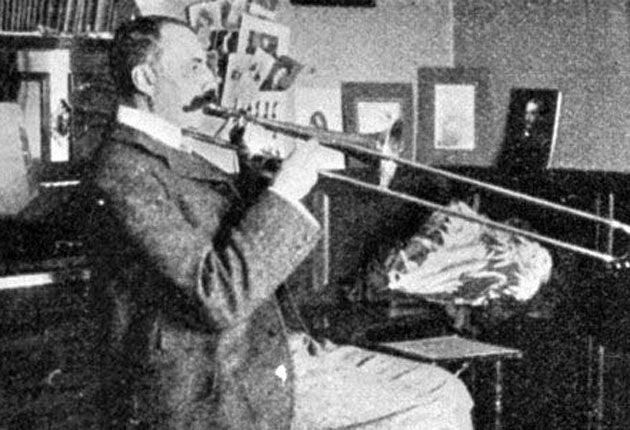Great composer, shame he couldn't play
Letter uncovered in museum reveals how Edward Elgar was so bad at the trombone it made people laugh

He is one of the world's most eminent composers, who cemented his reputation at the vanguard of the English Romantic movement with compositions such as the Enigma Variations and the Pomp and Circumstance marches.
But Edward Elgar was also a terrible trombone player, it has now transpired, even though he wrote the most beautiful melodies for the instrument in his compositions.
His skills were so poor that when the composer from Worcester started playing a specially inscribed trombone for a dear friend, she ran out of the room in a fit of hysterical laughter, leaving the composer swearing in frustration.
Sue Addison, the principal trombonist for the Orchestra of the Age of Enlightenment (OAE), who has been researching Elgar's trombone which is kept at the Royal College of Music, discovered a revealing letter written by his friend, Dora Penny, who often went to Elgar's home to listen to his compositions, and on whom he based a character in Enigma Variations.
The letter, which is only four lines long, recounted a comical incident in which Elgar revealed himself to be disastrous on the instrument. It read: "On one occasion, he [Elgar] got up and fetched a trombone that was standing in a corner and began trying to play passages in the score. He didn't do very well and often played a note higher or lower than the one he wanted... and as he swore every time that happened, I got into such a state of hysterics that I didn't know what to do. Then he turned to me [and said]: 'How do you expect me to play this dodgasted thing if you laugh?'
"I went out of the room as quickly as I could and sat on the stairs, clinging to the banisters 'til the pain eased but it was no good. I couldn't stop there as he went on making comic noises, so I went downstairs out of earshot for a bit."
The letter had been archived at the Elgar Birthplace Museum in Worcester but had not been noticed until now.
In the course of her research, Ms Addison also found that he took up the instrument at the age of 43, not as a young boy as had been previously believed.
The confusion may have arisen from an inscription on the bell of the trombone, which bears Elgar's name as well as the date 1875, which was assumed to be when he started playing the instrument, at 18 years of age. But an admission Elgar made in 1900 proves it lay untouched for decades.
Ms Addison said: "Elgar wrote hundreds of letters to his publisher, Jaegar, discussing changes to his work, and in one letter dated 1900, when he was writing The Dream of Gerontius, he writes a PS which said 'I'm learning the trombone', and he drew a sketch of himself playing it by the side of the letter. He later said he wasn't sure whether he was worse on the typewriter or the trombone."
The instrument was given by Elgar to the YMCA's Music Section in Worcester when they appealed for instruments in 1918 to send off to British troops abroad to raise morale. Elgar, then 63, wrote: "Why should I keep it for sentiment when the 'boys' can put it to use?"
It went "missing in action" until it was found at the Ealing Branch of the YMCA in 1934 following a series of adverts to locate it. The YMCA then donated the trombone to the Royal College of Music.
Ms Addison said she originally set out to discover if Elgar ever played his trombone publicly, as he is known to have done with the violin, organ, piano and bassoon. She will now play the composer's trombone in a performance by the OAE of The Dream of Gerontius at the Royal Festival Hall next Tuesday – the first time it has been played in a concert since Elgar's death in 1934. The OAE performance in London, and later in Birmingham Town Hall, will be a rare opportunity to hear the piece performed on original instruments with the same pitch as Elgar would have used.
Join our commenting forum
Join thought-provoking conversations, follow other Independent readers and see their replies
Comments
Bookmark popover
Removed from bookmarks